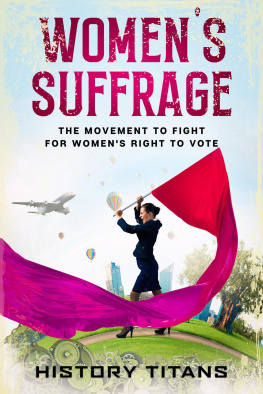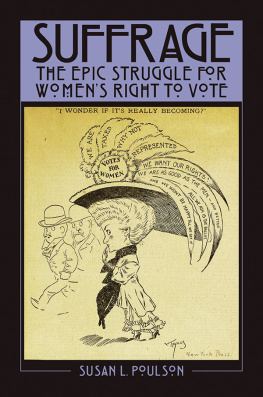Struggle and Suffrage in Leeds
Struggle and Suffrage in Leeds
Womens Lives and the Fight for Equality
Tina Jackson
First published in Great Britain in 2019 by
Pen & Sword HISTORY
An imprint of
Pen & Sword Books Limited
Yorkshire Philadelphia
Copyright Tina Jackson, 2019
ISBN 978 1 52671 6 842
eISBN 978 1 61121 3 423
Mobi ISBN 978 1 61121 3 423
The right of Tina Jackson to be identified as Author of this work has been
asserted by her in accordance with the Copyright, Designs and Patents Act 1988.
A CIP catalogue record for this book is available from the British Library
All rights reserved. No part of this book may be reproduced or
transmitted in any form or by any means, electronic or mechanical
including photocopying, recording or by any information storage and
retrieval system, without permission from the Publisher in writing.
Pen & Sword Books Limited incorporates the imprints of Atlas,
Archaeology, Aviation, Discovery, Family History, Fiction, History, Maritime,
Military, Military Classics, Politics, Select, Transport, True Crime, Air World,
Frontline Publishing, Leo Cooper, Remember When, Seaforth Publishing,
The Praetorian Press, Wharncliffe Local History, Wharncliffe Transport,
Wharncliffe True Crime and White Owl.
For a complete list of Pen & Sword titles please contact
PEN & SWORD BOOKS LIMITED
47 Church Street, Barnsley, South Yorkshire S70 2AS, United Kingdom
E-mail:
weblink: www.pen-and-sword.co.uk
Or
PEN AND SWORD BOOKS
1950 Lawrence Rd, Havertown, PA 19083, USA
E-mail:
weblink: www.penandswordbooks.com
Acknowledgements
At Pen & Sword, Roni Wilkinson, for commissioning this book, Amy Jordan for looking after it along the way and my editor, Karyn Burnham, for her excellent, meticulous work in preparing it for publication. For the lovely cover design, thank you to Heather Williams and Paul Wilkinson.
The great suffrage historian Jill Liddington, who I had the honour to meet and whose books are essential reading for anyone interested in the struggle of women in the North to get the vote.
Anthony Ramm at Leeds Local and Family History Library for help, advice and inspirational views on who writes history and who it belongs to.
Marc Jackson and Susan Stepan, Indexer at Leodis, Leeds Central Library, for help with picture research.
Vine Pemberton Joss for fascinating insights into the lives of nineteenth-century educational and health reformers and the suffrage movement.
Peter Higginbotham for kind permission to quote from his extensive research on workhouses and childrens homes.
Rachel Bellerby for advice, support and making this such an enjoyable project.
Karen Ingham for help with the history of nursing in Leeds. Maria Woods, Andi Walker, Kirstin Ramskir, Michaela Noonan, Joanna Ferguson, Sarah Selwood, Naziya OReilly, Jonathan Telfer, Matt Hill and Jan Davison for inspiration and support.
Chris Bradshaw for listening to endless tales of counting suffragists.
Most of all, my mother Patricia Jackson, whose intelligence, insight and stories of life at home and work for the bygone generations of our family brought the struggles and successes of women in Leeds vividly to life. She is one of the amazing, determined women this city breeds, and this book is for her.
Introduction
Amelia Crewe was born in Morley around 1878. Her father was a stonemason and her husband, Walter Brown, was a miner. When they married, Amelia and Walter moved into 8 Broadfoot Street, off York Road. The house had a long garden, used to grow fruit and vegetables, and a front room set up as a shop. In a mining community, accidents and hardship were common, and Amelia was lenient about letting women in her neighbourhood buy things on tick, knowing it was unlikely her neighbours would be able to pay their bills.
Amelia gave birth thirteen times. Five boys died. The eight children who survived were Elsie, born in 1900, Nellie, Millie, Hilda, Florrie, Edith, Dolly and Phyllis, the baby, born in 1918. To make ends meet, Amelia went charring at St James Hospital, and when they got home from school, the eldest daughters served in the shop, cleaned the house and the lavatory at the bottom of the long garden, and looked after their younger sisters. When they were 13, they went to work in nearby mills and factories.
Amelia was my great-grandmother. Her second daughter, Nellie, was my grandmother. Her first job, at 13, was in a toffee factory, but most of her working life was spent in textile factories, where she became a skilled and valued tailoress. Nellie was strong, kind, resilient, beautiful, and always up for fun and a laugh. A glamorous flapper in her youth, she adored clothes, and like many Leeds women, took great pride in being fashionable.
The lives of Amelia and Nellie are just two of the stories woven into the fabric of Leeds history. The story of the city is bound up with the story of its women workers: women like Nellie and her sisters, working in the textile mills, sweatshops and factories that transformed the citys landscape.
In 1851, there were 131,259 women living in Leeds. A century later, there were 367,199. The industries that accounted for the growth of the city relied on a vast workforce of women and girls. But who were these women, and what were their lives like?
There is little information widely available about them; during their lifetimes, their stories were not regarded as being of much consequence, and therefore were little documented. It has been realised only recently that the lives of everyday people are as fascinating a part of history as those who were used to their voices being heard.
The stories of hardships and inequalities faced by the women of Leeds, the ways that their lives improved, the formidable women who battled for advances in womens healthcare and education, and the free-spirited women who refused to be bound by conventional expectations, are bound up in the story of the fight, at grassroots level, for emancipation, equality and the right for women to vote.
Over the course of a century the story of the lives of women in Leeds is a not just a tale of struggle and suffrage, but of survival and success. At a time when, more than 100 years after some women in this country first got the right to vote, womens voices are still raised in protest, it has been a privilege to discover some of the realities of their lives and give their voices, so often unheard, a chance to be aired.
CHAPTER ONE
Women at Work
In June 1832, Elizabeth Bentley, a flax-mill worker from Leeds, was interviewed by Michael Sadler, a Leeds politician and campaigner against child labour, and his House of Commons Committee. Elizabeth, born in 1809, started work in a flax mill when she was 6. As a child I worked from five in the morning to nine at night, she said; there was a 40-minute break for lunch, but no other breaks, and if the children flagged in their work or were late, they were strapped.









